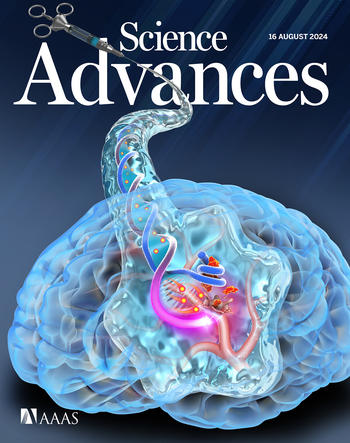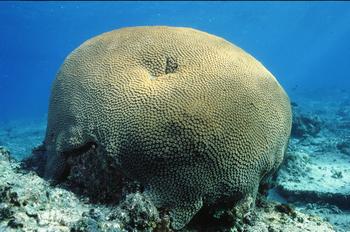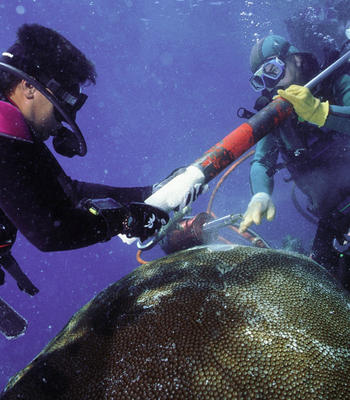Coral Sr/Ca-SST reconstruction from Fiji extending to ~1370 CE reveals insights into the Interdecadal Pacific Oscillation
Science Advances
That is the beautiful Diploastrea heliopora coral used in our study, 2.6m high and 627 years old, the ‘root’ certainly older. These coral are highly valuable ocean climate sensors.
Bildquelle: Jens Zinke
Collection of the core sample from the massive boulder coral in Fiji back in 1998. Joel Orempuller (IRD).
Bildquelle: Juan Pablo D'Olivo
News vom 15.08.2024
Abstract
The southwestern tropical Pacific is a key center for the Interdecadal Pacific Oscillation (IPO), which regulates global climate. This study introduces a groundbreaking 627-year coral Sr/Ca sea surface temperature reconstruction from Fiji, representing the IPO’s southwestern pole. Merging this record with other Fiji and central tropical Pacific records, we reconstruct the SST gradient between the southwestern and central Pacific (SWCP), providing a reliable proxy for IPO variability from 1370 to 1997. This reconstruction reveals distinct centennial-scale temperature trends and insights into Pacific-wide climate impacts and teleconnections. Notably, the 20th century conditions, marked by simultaneous basin-scale warming and weak tropical Pacific zonal-meridional gradients, deviate from trends observed during the past six centuries. Combined with model simulations, our findings reveal that a weak SWCP gradient most markedly affects IPO-related rainfall patterns in the equatorial Pacific. Persistent synchronous western and central Pacific warming rates could lead to further drying climate across the Coral Sea region, adversely affecting Pacific Island nations.
Dr. Juan Pablo D'Olivo and his colleagues have published a study in Science Advances that presents a groundbreaking 627-year reconstruction of coral Sr/Ca (strontium/calcium) derived temperature from the sea surface at Fiji. This study uses the longest continuous coral record ever reported to stake out how decadal variability in the Pacific Ocean influences global climate patterns. Furthermore, the study reveals that recent Pacific warming trends and weak temperature gradients are unusual compared to the past six centuries, suggesting that human-induced climate change is generating unprecedented patterns in the Pacific. This study shows why massive, long-lived corals are so important as archives of past climate change, but unfortunately their future is in jeopardy due to ocean warming.
Dr. Juan Pablo D'Olivo was member of the Geobiology and Anthropocene research group in the Paleontology section at the Institute of Geosciences of Freie Universität Berlin until 2023 and joined Universidad Nacional Autónoma de México (UNAM) in October 2024. The co-lead author Dr. Jens Zinke held the same position until 2018 before joining University of Leicester as a Professor.
DEUTSCH:
Dr. Juan Pablo D'Olivo und seine Kollegen haben in der hochrangigen Fachzeitschrift „Science Advances“ eine Studie veröffentlicht, die eine bahnbrechende 627-jährige Rekonstruktion der von Korallen abgeleiteten Sr/Ca (Strontium/Calcium)-Temperatur an der Meeresoberfläche vor den Fidschi-Inseln präsentiert. Diese Studie nutzt die längste kontinuierliche Korallenaufzeichnung, die jemals veröffentlicht wurde, um herauszufinden, wie die dekadischen Schwankungen im Pazifischen Ozean globale Klimamuster beeinflussen. Darüber hinaus zeigt die Studie, dass die jüngsten Erwärmungstendenzen im Pazifik und die schwachen Temperaturgradienten im Vergleich zu den vergangenen sechs Jahrhunderten ungewöhnlich sind, was darauf hindeutet, dass der vom Menschen verursachte Klimawandel im Pazifik noch nie dagewesene Muster erzeugt. Diese Studie zeigt, warum riesige, langlebige Korallen als Archive vergangener Klimaveränderungen so wichtig sind, aber die Erwärmung der Ozeane bedauerlicherweise auch ihre Zukunft bedroht.
Dr. Juan Pablo D’Olivo Cordero war bis 2023 Mitglied der Forschungsgruppe Geobiologie und Anthropozän in der Fachrichtung Paläontologie am Institut für Geowissenschaften der Freien Universität Berlin und wechselte im Oktober 2024 zur Universidad Nacional Autónoma de México (UNAM). Der Co-Leitautor Dr. Jens Zinke war bis 2018 in der gleichen Position tätig, bevor er als Professor an die University of Leicester wechselte.
Read more:
Science Advances
https://www.science.org/doi/10.1126/sciadv.ado5107
Contact
Dr. Juan Pablo D’Olivo Cordero
E-Mail: dolivo@cmarl.unam.mx


